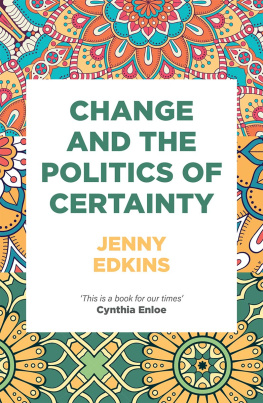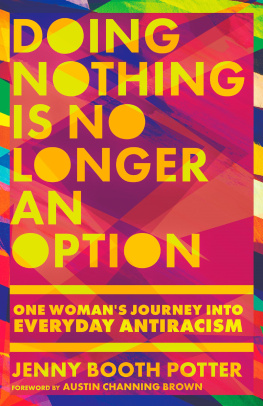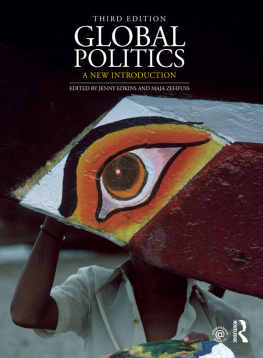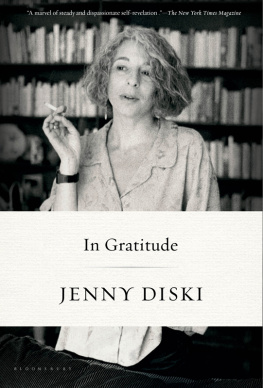Copyright Jenny Edkins 2019
The right of Jenny Edkins to be identified as the author of this work has been asserted by her in accordance with the Copyright, Designs and Patents Act 1988.
Published by Manchester University Press
Altrincham Street, Manchester M1 7JA
www.manchesteruniversitypress.co.uk
British Library Cataloguing-in-Publication Data
A catalogue record for this book is available from the British Library
ISBN 978 1 5261 1903 2 paperback
ISBN 978 1 5261 1901 8 hardback
First published 2019
The publisher has no responsibility for the persistence or accuracy of URLs for any external or third-party internet websites referred to in this book, and does not guarantee that any content on such websites is, or will remain, accurate or appropriate.
Typeset in Sabon LT Std by
Servis Filmsetting Ltd, Stockport, Cheshire
1 Construction site, Ground Zero, May 2014.
Photo: Jenny Edkins
2 Corner overlooking the site, Ground Zero, May 2014.
Photo: Jenny Edkins
3 Entrance, 9/11 Memorial, May 2014.
Photo: Jenny Edkins
4 Corner of South Pool, 9/11 Memorial, May 2014.
Photo: Jenny Edkins
5 Names on the 9/11 Memorial, May 2014.
Photo: Jenny Edkins
6 Photographing visitors attempting to photograph the inside of the 9/11 Museum, May 2014.
Photo: Jenny Edkins
7 Engraved soles of shoes. Footprints of Memory, Ty Celf/Art House, Laura Place, Aberystwyth, April 2017.
Photo: Vince Jones
8 Shoes hanging above their footprints. Footprints of Memory, Ty Celf/Art House, Laura Place, Aberystwyth, April 2017.
Photo: Vince Jones
Er cof
Joan Tolley
19222015
The endless longing of the underprivileged that history (and life) be different from what it has been and still is.
John Berger
In the current historical conjuncture, with continuing oppression and exploitation, increasing inequality, persistent racism, and the resurgence of forms of exclusion and state violence, the imperative for change seems undeniable. But difficulties and tensions arise once we attempt to bring it about. This book stems from my own struggle as an academic to articulate or unearth alternatives and forms of resistance, and my recognition that the tools we have at hand to attempt this move can be precisely those that have produced and hence continually reproduce what we are trying to escape. In particular, the fantasy of escape to an outside, to a better world is what entrenches us more firmly in the nightmare. And yet, giving up altogether on dreams of a different world is difficult, especially if, or maybe only if, we are in a position of racial, gender or class privilege.
One notable exponent of the dangers of thinking in terms of an outside to which we can escape is R.B.J. Walker. He begins his book Inside/Outside with a quotation from Gaston Bachelards The Poetics of Space: Outside and inside form a dialectic of division, the obvious geometry of which blinds us as soon as we bring it into play in metaphorical domains.
Maja Zehfuss points out how the idea of changing the world relies on the notion of an outside and a concomitant separation between us over here and the world over there. Unless we see ourselves as standing outside the world rather than being a part of it, the idea that we can decide to do something to change it is misplaced. If we are not outside if there is no outside then everything we do or do not do affects the world of which we are part. The desire to change the world, she reminds us, reveals a very particular attitude to the world, [where] we are at its centre and very much in charge. The world is there for us to do with as we please. We and here the we has to be we white Westerners we see ourselves as in control, whereas in reality social and political life is more complex and we are already implicated. What is more, we never know enough to decide what best to do, and we can never do everything we ought to do: tackling one problem involves neglecting others.
Another issue at stake is that seeing ourselves in a privileged position outside the world looking in, somehow superior and equipped to bring about change means there is a temptation to disregard those who disagree with our ideas of what should be done. They are in the world; we are above it. We see ourselves as doing our duty and perhaps repaying or securing our privilege by working to improve the world and the lives of other people. We are the givers we know what needs to be done they are the receivers. But, as Naeem Inayatullah points out, our gift may prompt resentment among the receivers: we are claiming to know what other people need, and telling them what they should do. Inayatullah gently encourages us to see our desire to help to change the world as a need also. We may suspect that our knowledge is incomplete, but attempt to conceal our doubt. Indeed, Inayatullah suggests that we emphasise what is good
What this approach entails might be both an acceptance of the tragedy of a world that is beyond our control, however privileged we are, and a retention of hope as Stuart Hall says, a politics without guarantees. We need to become streetwise, as those less secure than we like to think ourselves have always had to be.
What happens if we examine the assumptions that we are used to taking for granted? If we cannot stand outside the world and change it, what are we to do in the face of injustice? If as scholars we have no privileged standing in relation to the world, are we as helpless as anyone else? Should we be listening as much as, or more than, speaking or writing? Are our theories and our analyses useless, or even, more likely, counterproductive, re-inscribing the inequalities we seek to remove? Should we acknowledge that if there is no certainty about the past, we surely cannot predict the future? Would acknowledging this inadequacy enable a different form of politics? Or is this just another form of the same desire for escape?
In this book I wrestle with these questions through a series of reflections in three different registers that can be loosely characterised as autobiographical, aesthetic and quasi-theoretical. Several of the chapters draw on early prototype essays written as spin-offs from what seemed at one time to be the main trajectory of my work: an examination of sovereignty and subjectivity or, to put it otherwise, personhood and politics in the various contexts of famines, war and enforced disappearance. The embryonic essays arose as reflections on events, or from encounters with plays, films or exhibitions, or as responses to invitations to contribute chapters or talks. It turns out that these marginal writings are in fact not peripheral at all, but writings that tackle what is perhaps the most central question behind my work: what are we to do? This book draws together and re-examines these rather scattered thoughts thoughts that on the whole I have previously avoided addressing and examines where they lead.
Like the scattering of particles produced in a high-energy collision in a cloud chamber, tracing the tracks of thoughts generated when the attempt to write collides with the impossibility of doing so can tell us something, perhaps, about the nature of thinking itself. Of course, in practice, the impossibility of writing has to be overcome, we are told: research targets have to be met, metrics satisfied. Books have to be finished and published despite the way thoughts inevitably escape the page.








